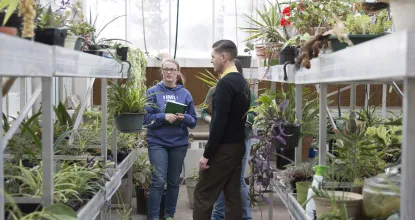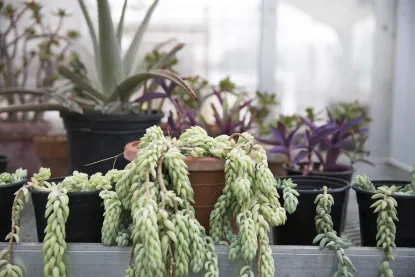
NMU’s Medicinal Plant Chemistry degree was the first 4-year undergraduate degree of its kind in the nation designed to prepare students for success in the emerging industries relating to medicinal plant production, analysis, and distribution. While not specific to cannabis, Medicinal Plant Chemistry leads the way for chemists to enter a growing field.
The NMU “ecosystem” of related programs has developed to offer opportunities in many areas related to the cannabis industry. Below are the degrees, certificates and non-credit programs available at NMU.

Medicinal Plant Chemistry (B.S.)
The Medicinal Plant Chemistry program at Northern Michigan University is not only unique in its scope and content, but has been designed and organized to promote maximum support and student success through mixed cohorts and a year-long capstone experience.
The required coursework provides a foundation in chemistry and plant biology, with a capstone research experience involving experimental horticulture and instrumental analysis of natural products, while focus tracks allow students to explore their interests in the relevant areas of business and accounting (Entrepreneurial Track) or advanced topics in chemistry and biology (Bio-analytical Track).

Botany (concentration for B.S. in biology)
Botany provides an opportunity for a diversified background in the study of structure, growth, reproduction, metabolism, development, diseases of plants. Applications in forestry, horticulture, ethnobotany, and agronomy afford a wide range of introductory positions in business and industry, universities, and government at the local, state, and federal levels. It also provides preparation for graduate work in botany or related sciences.

Cannabis Operations (certificate)
Students gain an understanding of cannabis regulations and advanced dispensary retail while learning to interact with and lawfully instruct others about cannabis and related product use. In this online program, students also develop foundational knowledge of the cannabis business environment and regulatory components of day-to-day sales operations, including establishing ongoing compliance protocols.

Plant-Based Wellness (certificate)
The Plant-Based Wellness Certificate focuses on the development of skills needed for careers in the quickly growing plant-based wellness industry including retail and frontline services. Students develop the competencies needed to interact with and lawfully instruct others about plant-based wellness and how plants and plant-based products can impact systems in the human body. Historical elements of integrating plants into wellness, the foundational knowledge needed to pursue plant-based wellness careers, and regulatory compliance and established practices for remaining compliant are emphasized.

Cannabis and Plant-Based Wellness Operations (Associate of Applied Science)
The Cannabis and Plant-Based Wellness Operations A.A.S. focuses on the development of frontline skills needed for careers in the quickly expanding cannabis and other plant-based wellness retail industries. Students develop the competencies needed to interact with and lawfully instruct others about cannabis and other plant-based wellness, including how plant-based products can impact systems in the human body. Regulatory components of cannabis and other plant-based wellness retail operations including processes for establishing compliance protocols as well as practices for remaining compliant are emphasized. Instruction incorporates traditional use of cannabis and other plants for wellness.

Indoor Agriculture (Associate of Applied Science)
Indoor Agriculture AAS is a collaboration among multiple departments and academic programs and is the first known higher education interdisciplinary indoor agriculture program. The program provides students with hands-on, exploration-based learning of indoor agriculture, associated growing, and environmental infrastructure systems. Growing climate and population concerns underscore the need for efficient and sustainable farming practices to help reduce depletion of resources. Adaptation of indoor, urban farming models to northern climates in multiple structure and building types in order to provide fresh, local food and medicinal plant sourcing year- round highlights this program’s push for sustainability.

Controlled Environment Agriculture (B.S.)
The Controlled Environment Agriculture (CEA) program is designed to take an interdisciplinary, collaborative approach to learning fundamental elements of the new and rapidly emerging indoor agriculture industry. The program includes five areas of focus to provide students with a well-rounded education which will prepare them for a variety of career opportunities. The focus areas include indoor growing systems and methods, plant biology, building systems, health and nutrition, and business operations.

Continuing Education (Non-Credit certificates)
NMU partners with Green Flower Inc. to provide non-credit certificates in:
- Cannabis Cultivation - Master the essentials of growing cannabis in a commercial environment – indoors, outdoor, or greenhouse.
- Cannabis Product Development - Explore how cannabis products are created, from sourcing and formulation to testing and packaging.
- Cannabis Retail & Sales - Gain the expertise to succeed in cannabis retail and brand sales, from product knowledge to operations and compliance.
- Cannabis Compliance - Become the compliance expert every cannabis business needs, from cultivation to retail.
- Medical Cannabis - Become a trusted guide for patients and providers through accurate, science-backed cannabis education.
The non-credit certificates are designed for those who do not need academic credit and are in interested in less in-depth, applied learning in flexible, self-paced formats.